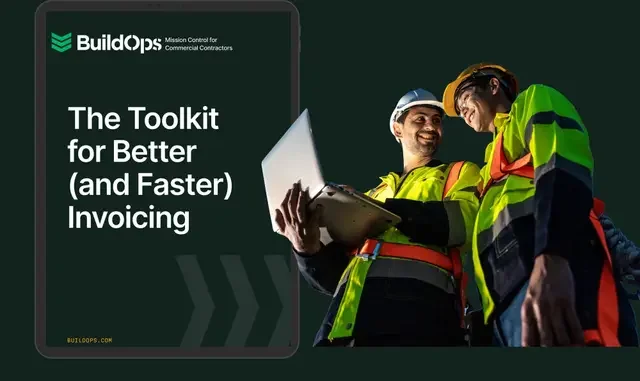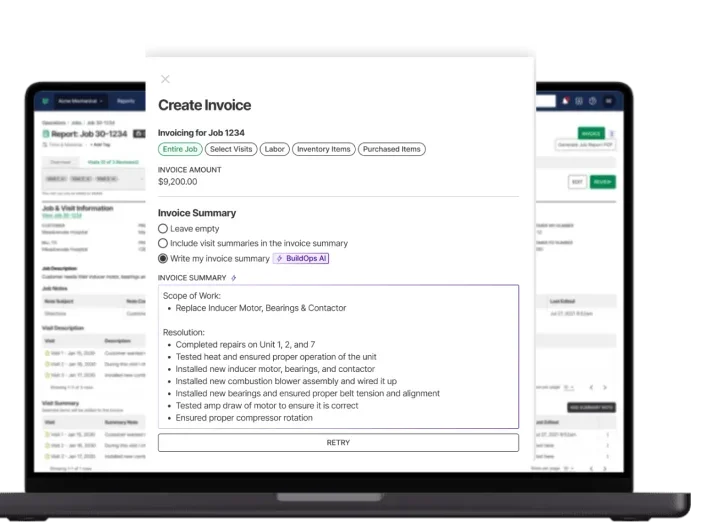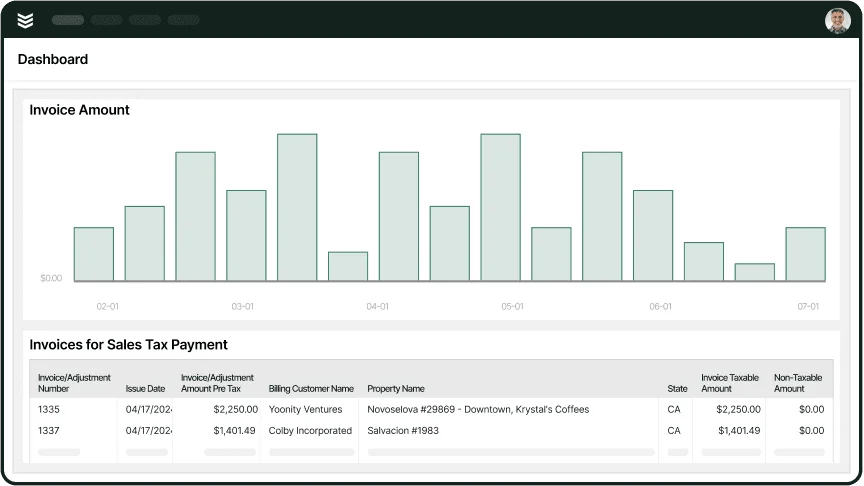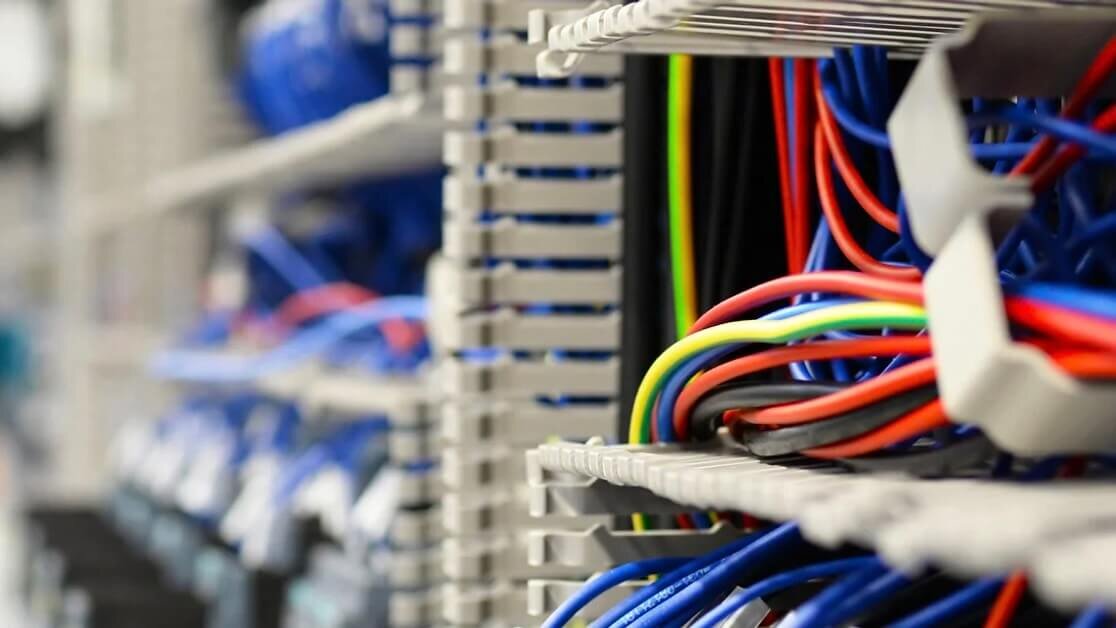Running an electrical business means juggling a hundred things at once—managing jobs, tracking payments, and keeping customers happy. But one thing that should never slow you down? Invoicing. The right electrical invoice software makes billing faster, payments easier, and cash flow more predictable. No more chasing down unpaid invoices or losing track of what’s owed. For those working in the electrical industry, having a system built specifically for electrical field service teams is a game changer. The right software helps businesses stay organized, improve cash flow, and get paid on time.
In this guide, we’ll break down what to look for in invoicing software built for electrical professionals. Whether you're a contractor, field service tech, or business owner, we’ll cover:
- Choosing the right electrical invoice software for your team
- 9 key features to look for in electrical invoice software
- Best for commercial
- Best for residential
- Best for general contractors
- Other invoicing software for electrical contractors
- 7 benefits of using electrical contractor invoice software
- 4 important electrical contractor invoicing software FAQs answered
A streamlined invoicing process means more time on the job and less time buried in paperwork. Let’s start with what matters most—picking the right software for your team.
Choosing the right electrician invoice software for your team
Electrical professionals need invoicing software that keeps jobs organized, speeds up payments, and reduces manual work. But with so many options, how do you know which one fits your team’s needs? Before making a decision, consider the following:
- Business compatibility – Does the software support the type of work you do, whether it’s residential service calls, large-scale commercial projects, or subcontracting?
- Ease of use – Can field techs generate invoices on-site? Will office staff be able to process payments and track outstanding balances without extra steps?
- Integration with existing tools – Does the software connect with accounting platforms like QuickBooks or job management systems you already use?
- Cost and scalability – Are there hidden fees for additional users or transactions? Can the pricing structure grow with your business?
- Essential features – Beyond basic invoicing, does it include automation, recurring billing, customer portals, or robust reporting tools?
With these key factors in mind, let’s take a look at the essential features every electrician invoicing software should have.
9 key features to look for in an electrician invoicing software
Keeping track of invoices, payments, and job details is critical to running a smooth operation. Whether you’re managing a team of field service techs or handling invoicing yourself, the right software eliminates delays, reduces errors, and keeps cash flow steady. Without it, unpaid invoices pile up, payment tracking becomes a headache, and administrative work cuts into time better spent on the job.
1. Automated scheduling and dispatching
Efficient scheduling keeps jobs on track, while automated dispatching ensures techs get to the right place at the right time. For electrical contractors, using an invoicing system with built-in scheduling and dispatching tools helps avoid double bookings, last-minute cancellations, and wasted trips.
Consider this: A crew is assigned to install a new panel at an office building, but the job gets delayed due to an oversight in scheduling. Without automation, the dispatcher scrambles to reassign the team, wasting hours. With the right software, the schedule updates in real time, techs receive instant notifications, and invoices automatically adjust for any changes—keeping the workflow efficient and reducing billing mistakes.
2. Integrated customer management
Keeping track of client history, job details, and service records is essential for smooth operations. A system with customer management for contractors centralizes all client interactions, making it easy to track past invoices, upcoming jobs, and outstanding balances. Think about a technician arriving at a site for a service call, only to realize the client has an unpaid invoice from their last visit.
Without quick access to records, collecting payments becomes a hassle. With an integrated CRM, techs can pull up the account on their mobile device, remind the client of the outstanding balance, and even process the payment on the spot—eliminating awkward follow-ups and ensuring steady cash flow.
3. Mobile invoicing for field service techs
Electrical work happens in the field, not behind a desk. An invoicing system with mobile capabilities for field service allows techs to generate and send invoices immediately after finishing a job. Picture a technician wrapping up an emergency panel repair and hands the client a paper invoice, which then gets lost before payment. Weeks later, the office is chasing down an overdue bill. With mobile invoicing, the tech finalizes the job, sends a digital invoice before leaving the site, and even offers online payment options—ensuring faster payments and fewer disputes.
4. Automated payment processing
Chasing payments is a major headache for electrical businesses. A system with automated payment processing streamlines collections by offering online payments, automatic reminders, and secure transactions. Imagine completing a large commercial project, only to wait weeks for a check to arrive. Meanwhile, expenses pile up, and cash flow tightens. With automated payments, clients receive invoices with a secure payment link, reminders go out automatically, and funds are deposited without the back-and-forth—keeping the business running without delays.
5. Real-time reporting and job costing
Understanding job profitability and business performance requires access to real-time data. An invoicing system with reporting tools provides electrical contractors insights into revenue, expenses, and outstanding balances. Let’s say an electrical contractor notices that profits are shrinking despite steady business. Without accurate reports, pinpointing the issue is a challenge. With real-time analytics, they can see which jobs are underpriced, where delays are happening, and how labor costs affect the bottom line—allowing for smarter pricing and resource allocation.
6. Service agreements and recurring billing
For contractors handling maintenance contracts, recurring invoices save time and prevent missed payments. A system with service agreements for electrical contractors automates billing cycles, ensuring clients are invoiced on time every time. Think about a company that provides monthly electrical inspections for commercial properties. Without automation, someone has to manually create and send invoices each billing cycle. With service agreements, invoices are generated automatically, clients receive reminders, and payments processed without extra effort—ensuring predictable revenue and fewer overdue accounts.
7. Time tracking for accurate billing
Accurate labor tracking ensures that every billable hour is accounted for. A time tracking system integrates directly with invoicing, preventing underbilling and disputes.
8. Project pipeline visibility
A pipeline management tool allows contractors to track job progress, pending invoices, and upcoming projects in one place. This helps businesses anticipate cash flow needs and avoid financial bottlenecks.
9. Fleet management for job coordination
Coordinating service calls and tracking vehicle usage is easier with fleet management tools for electrical contractors. It ensures that the right team gets to the job site on time while reducing fuel costs and unnecessary mileage.

Get the Invoicing Toolkit
Perfect your invoicing execution so you’re always paid on time—never late.
When electrical contractors have the right invoicing software, administrative tasks become less of a burden. These additional features may not be essential, but they help businesses operate more smoothly, reduce errors, and improve profitability. Now, let’s look at the best electrical invoicing software options for different types of contractors.
Best electrician invoice software for commercial: BuildOps
BuildOps is designed specifically for commercial electrical contractors, providing a robust invoicing solution that integrates seamlessly with job costing, dispatching, and scheduling. Unlike general invoicing platforms, BuildOps is built for large-scale electrical projects where tracking labor, materials, and service history is essential.
With automated workflows, electricians can generate detailed, professional invoices directly from completed work orders. This ensures that all billable labor and materials are accounted for, reducing revenue loss due to manual errors. The platform also includes automated reminders for overdue payments and real-time financial reporting, giving contractors full visibility into their cash flow.
How Pricing Works: We offer both weekly live demos and personalized sessions to assist you in exploring the features and determining the optimal solution for what your business requires.
Features Beyond Invoicing: BuildOps goes beyond simple billing, offering tools for service agreements, job costing, and dispatching to keep operations running smoothly. These features help electrical contractors manage ongoing contracts, create precise estimates, and track project profitability in real-time.
What Sets It Apart For Commercial: BuildOps is built for electrical contractors handling complex, multi-phase projects. Unlike generic invoicing platforms, it provides in-depth financial tracking, integrates with project management tools, and streamlines workflows to eliminate inefficiencies.

See how BuildOps invoicing works
Simplify billing, speed up payments, and gain full financial visibility with BuildOps.
Best for residential: Housecall Pro
Image Source: Housecall Pro
Housecall Pro is an intuitive invoicing solution tailored for residential electrical contractors. It simplifies the process of creating and sending invoices, processing payments, and managing client billing history. Its user-friendly design helps electricians generate invoices quickly, making it a strong choice for service-based businesses.
However, its focus on residential work means it may lack some of the advanced features that commercial contractors need, such as in-depth job costing or complex financial reporting.
How Pricing Works: Housecall Pro follows a tiered pricing model, with monthly plans starting at around $79 for basic invoicing features, scaling up for more advanced options.
Features Beyond Invoicing: In addition to billing, Housecall Pro includes customer management and online booking, helping electricians maintain relationships with repeat clients while streamlining payment collection.
What Sets It Apart For Residential: Housecall Pro makes it easy for electricians to generate invoices and get paid on-site, reducing payment delays. It’s built with small-scale service jobs in mind, offering features like automated reminders and customer communication tools. However, for contractors working on large commercial projects, it may not provide the necessary financial tracking capabilities.
Deep Dive
Want to dive in further? Check out our head-to-head feature comparison Housecall Pro vs BuildOps right here to see which one is a better fit for your team.
Best for general contractors: Jobber
Image Source: Jobber
Jobber is an all-in-one invoicing and service management platform designed for electrical contractors who also handle other trades. It offers a simple, automated billing process with reminders and payment tracking but may not include advanced tools for large-scale electrical projects.
It’s best suited for small to mid-sized operations needing an easy way to send invoices and manage client payments. Despite that, for electrical contractors working on complex commercial projects, Jobber lacks certain features like deep financial tracking and integration with project management tools.
How Pricing Works: Jobber offers plans starting at around $129 per month for basic invoicing, with higher-tier options that include additional scheduling and workflow automation features.
Features Beyond Invoicing: The platform provides job scheduling and automated follow-ups, making it easier for contractors to maintain customer relationships while managing daily operations.
What Sets It Apart For General Contractors: Jobber is designed for electrical contractors managing multiple service types, such as HVAC or plumbing, alongside electrical work. While it offers invoicing capabilities, it may not be the best choice for those needing project-based job costing or integrated dispatching.
Other notable invoice software features for electricians
Several other platforms provide robust invoicing features for electricians, in addition to the top invoicing tools for various electrical businesses. While they may not be the best fit for large-scale commercial operations, they provide useful tools for smaller contractors and field service professionals.
Joist
Image Source: Joist
Joist is a simple invoicing and estimating tool designed for small electrical businesses and independent contractors. It allows electricians to create professional invoices, send estimates, and accept payments directly from clients. The mobile-friendly design makes it a convenient choice for electricians handling service calls and small projects. However, it lacks advanced job costing or dispatching features found in more robust platforms.
How Pricing Works: Joist offers a free version with basic invoicing capabilities. The Pro version starts at $8 per month, unlocking additional features like automated reminders and custom branding.
Features Beyond Invoicing: Joist includes estimating tools and payment processing, helping electricians create accurate job quotes and streamline payment collection.
What Sets It Apart For Independent Contractors: Joist is best for self-employed electricians who need a simple, mobile-friendly invoicing tool. However, it may not be ideal for teams requiring scheduling, job tracking, or integrated financial reporting.
FieldEdge
Image Source: FieldEdge
FieldEdge is a field service management platform that includes invoicing, scheduling, and customer relationship management. It’s designed to help electricians streamline their operations and track job profitability. While it offers strong invoicing tools, it may not be the best option for contractors needing specialized job costing or large-scale project management.
How Pricing Works: FieldEdge operates on a subscription-based model, with pricing available upon request.
Features Beyond Invoicing: The platform integrates customer management and dispatching, allowing electrical businesses to track service history and improve efficiency.
What Sets It Apart For Service-Based Electricians: FieldEdge is useful for electricians focused on service work and maintenance contracts. However, its pricing may be too high for small independent contractors.
Workiz
Image Source: Workiz
Workiz is a field service management tool that offers invoicing, job scheduling, and payment collection. It’s built for electricians, plumbers, and HVAC technicians who need a way to manage jobs and payments from a single platform. While it simplifies invoicing, it may not provide the in-depth financial tracking needed for larger electrical businesses.
How Pricing Works: Workiz offers pricing plans starting at around $65 per month for basic features, with higher-tier plans available for larger teams.
Features Beyond Invoicing: Workiz includes job scheduling and team tracking, helping electrical businesses coordinate service calls and improve field efficiency.
What Sets It Apart For Small Electrical Businesses: Workiz is a solid choice for electricians who need an all-in-one solution for job management and invoicing. However, it may not be the best fit for contractors working on complex commercial projects.
FieldPulse
Image Source: "FieldPulse
FieldPulse is a cloud-based field service management tool with invoicing, quoting, and scheduling features. It’s geared toward small to mid-sized electrical businesses looking for an easy way to manage jobs and collect payments. While it provides strong invoicing tools, it lacks some of the automation and financial tracking features found in more advanced platforms.
How Pricing Works: FieldPulse pricing starts at approximately $89 per month, with additional costs for expanded features and extra users.
Features Beyond Invoicing: The platform includes quoting and contract management tools to help electricians streamline customer interactions and close more deals.
What Sets It Apart For Growing Electrical Teams: FieldPulse is a good fit for electricians looking to scale their business, but it may not be ideal for large commercial contractors needing detailed job costing and financial reporting.
Check out our feature breakdown of FieldPulse vs BuildOps to see which tool meets your team’s needs better.
7 benefits of using electrician invoice software
Electrical contractors have enough on their plate—managing jobs, tracking materials, and keeping customers happy. Invoicing shouldn't slow you down. The right software eliminates paperwork, reduces errors, and speeds up payments, allowing you to focus on the job instead of chasing invoices. Here’s how it benefits electrical businesses.
1. Faster payments and improved cash flow
Getting paid on time keeps your business running. Manual invoicing often leads to delays, lost paperwork, or customers forgetting to pay. With automated invoicing, invoices are sent instantly, with built-in reminders to nudge clients when payments are overdue. This ensures a steady cash flow without the hassle of constant follow-ups.
Expert Tip
And timing matters—a lot. Recent data shows that contractors who invoice within 24 hours of finishing a job are 75% more likely to get paid on time. Delays in invoicing by even a few days can cause significant delays in cash flow.
2. Fewer invoicing errors and disputes
Errors on invoices—whether it's incorrect labor hours, missing materials, or duplicate charges—can slow down payments and frustrate customers. A reliable electrical invoice app reduces mistakes by automatically pulling job details, labor time, and materials directly from completed work orders, ensuring accuracy in every bill sent.
3. Organized customer and job history
Keeping track of past work, outstanding balances, and client communications can get messy when relying on spreadsheets or paperwork. A CRM tool for electrical contractors centralizes all customer information, making it easy to track invoices, payment history, and upcoming jobs—all from one dashboard.
4. More time spent on jobs, less on admin work
Every hour spent chasing payments or filling out invoices is an hour not spent on actual electrical work. With automated invoicing, contractors and office staff free up time by eliminating manual billing tasks. This means more focus on growing the business and less time buried in paperwork.
5. Professional, branded invoices for a better customer experience
A generic invoice doesn’t leave the best impression. Customizable invoice software lets electrical businesses create professional, branded invoices that reflect their company’s identity. Clear, itemized billing builds trust with customers and reduces payment disputes.
6. Easier tax reporting and financial tracking
At tax time, scrambling to gather invoices and track income is a headache. A strong electrical invoicing software for contractors provides financial reports, helping electricians keep track of earnings, expenses, and taxes—ensuring compliance and making tax filing smoother.
7. Mobile invoicing for on-the-go billing
Electricians work on-site, not in an office. Being able to generate and send invoices from a phone or tablet means no more waiting until the end of the day to bill a client. With mobile-friendly invoicing, contractors can send invoices immediately after completing a job, reducing payment delays.
A well-run electrical business depends on efficiency, and that includes invoicing. The right software helps contractors stay organized, get paid faster, and spend more time on the job rather than chasing paperwork.
Expert Tip
Check out some real-life electrical invoice examples to see how leading brands leverage invoicing to speed up payment times and mitigate late—or delayed—payments. This means steadier, more reliable cash flow.
4 important electrician invoicing software FAQs answered
Electricians, field service techs, and electrical business owners rely on invoicing software to streamline billing, reduce manual work, and improve cash flow. Below are the most common questions about electrical invoicing software, answered clearly and concisely.
1. What is electrical invoice software?
Electrical invoicing software is a digital tool that helps electrical field service businesses create, send, and track invoices. It automates reminders and reduces errors by pulling job details directly into invoices, which improves accuracy, speeds up payments, and simplifies financial management.
2. How does electrician invoicing software work?
Invoicing software streamlines the billing process by:
- Generating invoices based on completed jobs
- Automating payment reminders to reduce delays
- Accepting digital payments for faster transactions
- Integrating with scheduling and job management tools
- Providing financial reports for tracking revenue and expenses
By eliminating paperwork and manual calculations, it helps electrical professionals focus on their work instead of administrative tasks.
3. Is invoicing software worth the cost for electricians?
Yes. Investing in invoicing software saves time, reduces missed payments, and improves cash flow. Instead of chasing unpaid invoices or manually creating bills, electricians can automate the process—leading to fewer errors and faster payments. Many platforms offer features like mobile invoicing, financial reporting, and integrations with accounting software, making them a valuable investment.
4. What are the best practices to follow when implementing an electrical invoicing software?
To get the most out of invoicing software, electricians should:
- Choose a platform that integrates with their existing tools
- Train their team on how to use it effectively
- Automate recurring invoices and payment reminders
- Regularly review financial reports to track performance
- Ensure customers can pay easily with multiple payment options
- Set clear payment terms on invoices to avoid confusion or delays
- Use mobile invoicing to send bills immediately after job completion
- Sync invoicing software with accounting tools for seamless bookkeeping
- Monitor overdue invoices and follow up with clients promptly
- Customize invoice templates to maintain a professional and branded look
Implementing these best practices helps electrical businesses maximize efficiency and keep finances organized.
Invoicing is a critical part of running an electrical business, but it doesn’t have to be a hassle. The right invoicing software helps electricians get paid faster, reduce paperwork, and stay on top of their finances. From automated payment reminders to mobile invoicing and real-time financial tracking, the features covered in this guide can make a huge difference in how efficiently a business operates.
Not all invoicing tools offer everything electrical businesses need. Some platforms lack mobile invoicing, while others don’t integrate well with job tracking or scheduling. That’s why it’s important to choose a solution that’s built for the way electricians work—whether that’s managing large-scale commercial projects or handling routine service calls. BuildOps brings all these features together in one platform, designed specifically for commercial field service businesses.

Want to see how it works for your business?
Explore how BuildOps can streamline invoicing and reduce late payments.







